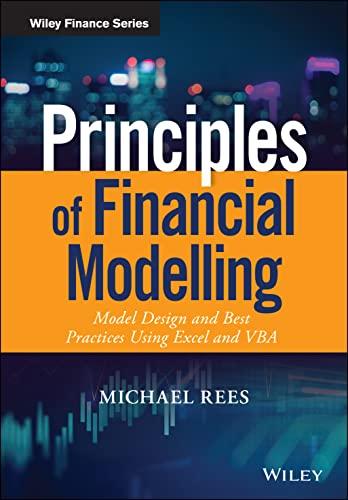Answered step by step
Verified Expert Solution
Question
1 Approved Answer
1 . A project costs $ 4 5 0 , 0 0 0 . It has a 1 0 - year useful life and no
A project costs $ It has a year useful life and no salvage value. Depreciation is straightline to zero over the life of the project. The tax rate is and the required return for the project is assume no debt You have the following estimates for the basecase and you believe the estimates are accurate to :Unit sales: Priceunit: VCunit: FCyear:
What is the VCunit number you would use when determining the bestcase scenario?
A project costs $ It has a year useful life and no salvage value. Depreciation is straightline to zero over the life of the project. The tax rate is and the required return for the project is assume no debt You have the following estimates for the basecase and you believe the estimates are accurate to :Unit sales: Priceunit: VCunit: FCyear:
What is the Unit sales number you would use when determining the worstcase scenario?
A project costs $ It has a year useful life and no salvage value. Depreciation is straightline to zero over the life of the project. The tax rate is and the required return for the project is assume no debt You have the following estimates for the basecase and you believe the estimates are accurate to :Unit sales: Priceunit: VCunit: FCyear:
Calculate the worstcase NPV
A project costs $ It has a year useful life and no salvage value. Depreciation is straightline to zero over the life of the project. The tax rate is and the required return for the project is assume no debt You have the following estimates for the basecase and you believe the estimates are accurate to :Unit sales: Priceunit: VCunit: FCyear:
The basecase NPV is Calculate the sensitivity of the projects NPV to changes in unit sales.
A project costs $ It has a year useful life and no salvage value. Depreciation is straightline to zero over the life of the project. The tax rate is and the required return for the project is assume no debt You have the following estimates for the basecase and you believe the estimates are accurate to :Unit sales: Priceunit: VCunit: FCyear:
Using your unrounded answer in question # what would be the projects NPV if you were able to sell fewer units?
A project costs $ It has a year useful life and no salvage value. Depreciation is straightline to zero over the life of the project. The tax rate is and the required return for the project is assume no debt You have the following estimates for the basecase and you believe the estimates are accurate to :Unit sales: Priceunit: VCunit: FCyear:
The basecase NPV is Calculate the sensitivity of the projects NPV to changes in VCunit
A project costs $ It has a year useful life and no salvage value. Depreciation is straightline to zero over the life of the project. The tax rate is and the required return for the project is assume no debt You have the following estimates for the basecase and you believe the estimates are accurate to :Unit sales: Priceunit: VCunit: FCyear:
Using your unrounded answer in question # what would be the projects NPV if VCunit is $ instead of $
Step by Step Solution
There are 3 Steps involved in it
Step: 1

Get Instant Access to Expert-Tailored Solutions
See step-by-step solutions with expert insights and AI powered tools for academic success
Step: 2

Step: 3

Ace Your Homework with AI
Get the answers you need in no time with our AI-driven, step-by-step assistance
Get Started


